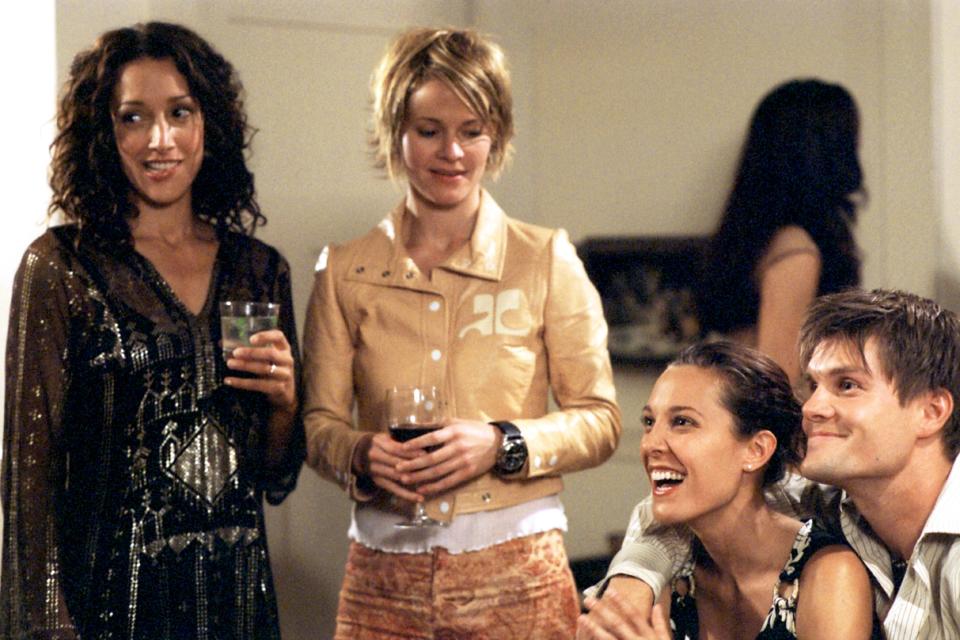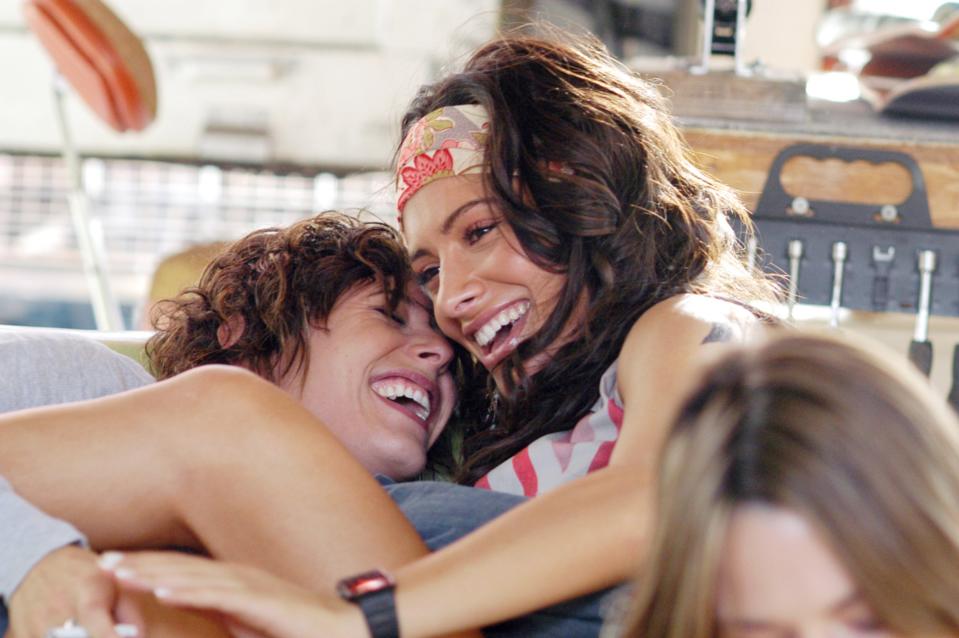LGBTQ+ People on the Power of Watching The L Word for the First Time
It’s a snowy night in Toronto, and I’m surrounded by lesbians. We’ve all crowded into the Tiff Bell Lightbox, for an advance screening of The L Word: Generation Q, which premiered December 8 and is the reboot of the popular lesbian-centric series that aired on Showtime for six seasons. This is, as my too-generous wife reminds me, my first L Word viewing party—I was a young teenager when the original series aired.
The L Word aired long before the popularization of streaming services, a time when queer characters were essentially ignored on mainstream TV and viewers would rarely, if ever, hear the word lesbian in any scripted program. It was the era of Limewire and DVDs, and an age of immense desperation for LGBTQ+ representation in all media. And so The L Word became a pivotal show for LGBTQ+ people of various backgrounds, experiences, and ages. Almost everyone I’ve talked to who has endured five seasons of listening to the show’s “The Way That We Live” theme song—the catchy tune didn’t play for the first season—has a story about watching The L Word. For many, the show became central in their coming-out process or their bonding experience with other queer people.
Back to the screening: As a diverse group of women clapped for Shane McCutheon as she descended the steps of a private plane, cheered and hollered Bette Porter’s name as she clapped back on screen, and oohed at Alice Piesczieki’s newfound success, the appeal of The L Word watch party—an almost mystified experience I couldn’t quite take part in the first time around—surrounded me. I realized there’s nothing like cheering on your (fictional) heroes among queer fam. Especially in a foreign city where you’re significantly less likely to run into an ex.
Watching the original The L Word meant so much to so many different people. I spoke to six of them to share their experiences.

THE L WORD, Jennifer Beals, Leisha Hailey, Erin Daniels, Landy Cannon, (Season 1), 2004-09, © SHOWTI
Elizabeth Estochen, 29, Denver, queer poet and host of Sexdentified
“I came out of the closet 10 years ago, and The L Word has a special place in my heart for how instrumental it was in my coming out. I actually started rewatching it recently (for the third time!) to gear up for the reboot. While the representation was the first of its kind, and seeing lesbian sex on TV was huge for me, I certainly have my opinions on how the show dealt with transness, consent, monogamy (and totally ignoring polyamory as an option), and emotional responsibility. I started watching the show in 2009, so the first few seasons were on Netflix and the [last season] was airing. Before I came out, I watched it alone. After I came out, I had another lesbian as a roommate, and some friends who would come over and we’d watch together. There was a local lesbian bar, in North Charleston, called The Chart that had viewing parties. Unfortunately I never went because I was a baby gay, and the crowd that frequented the bar was mostly elder lesbians. I wish I’d gone before that place shut down.”
Alexa Carmona, 24, Brooklyn, singer, songwriter, and producer who performs as broox)
“When I was 12, I walked in on my grandma and aunt watching The L Word during a Shane and Carmen sex scene. I remember asking myself, ‘Why am I into this?’ Years later I saw a post about it on Tumblr and was like, Oh my God, my young confusing fantasies now make sense and can be fulfilled. The show was my escape, and I’d run home to watch alone after class sophomore year of college. I didn’t have many queer friends yet, but sometimes I’d make my straight cis friends watch in the living room with me. They had a lot of questions, naturally, and they liked to watch because they thought Shane was hot. I binged all six seasons in a couple months. I remember feeling seen and understood for the first time in a while. I was learning so much of this world that I was so excited to step into and explore, a world that started to feel more tangible. It’s as if The L Word was my queer night school that I was so exited to come home to. I remember specifically watching shows for the lesbian plot, so to find a show where its entire storyline is taking place surrounded by lesbian drama was like digging for gold and hitting the jack pot.
“I desperately wanted a queer group of friends. I wanted an Alice to lean on, and a Shane to wing-woman me at the bar. Throughout the years I’ve found my queer people, my family. One by one, like a domino effect. If there’s one thing about the queer community, it’s that if you meet one queer, one turns into five, into 10, and eventually you end up meeting a million. It’s truly never fucking ending. And I love it. We’re a tightly knit community consisting of beautiful individuals who are strong and look out for one another. This queer community of mine has made me who I am today, supporting me and my music. Now I will be watching the Generation Q premiere with them in my living room, listening for my song, ‘Low Key,’ featured in one of the scenes.”
Angelina Darrisaw, 32, New York City, founder and CEO of C-Suite Coach
“I first watched The L Word as a freshman at Davidson College. It was life-changing at a time when so many of us were questioning, because it had so many answers, drove conversations, and forced us to reconsider our own stereotypes about what a queer relationship had to look like. There were so many representations of various styles of relationships and types of women included. We were all complete thirstbuckets for the show, and we never watched a single episode alone. It was always a group activity. I watched with an upperclassman, a female friend who was an out lesbian, who introduced me to it. We didn’t have Showtime on our campus, so she actually bought the DVDs and we would watch one at a time. It started with just us, and over time we would invite other women. It was always such good bonding. Usually on Sunday nights in my dorm room or common area. It made an otherwise isolating experience, being in the South on a really Christian campus, feel way less isolating.”

THE L WORD, Katherine Moennig, Sarah Shahi, 'Light My Fire', (Season 3, ep. #304), 2004-09, photo: P
Caitlin Copple Masingill, 36, Boise, founder and president, Full Swing PR
“The L Word was huge in my own coming-out process. I binge-watched the series in my apartment in Sun Valley, Idaho, where I worked as a cocktail waitress for a year. I watched it with my best friend, Amy, who was straight but very supportive of my coming out-process. Having also grown up in rural Idaho, she was pretty intrigued by the L.A. lesbian subculture of the day. I couldn’t find any lesbians to date in Idaho, so it was a rough year, but watching The L Word gave me hope that I’d find someone eventually and be able to explore my true sexual orientation. Sure enough, when I moved to Montana for graduate school, Missoula proved to be full of lesbians, and watch parties of The L Word ensued. I met my first girlfriend shortly after I moved there. I dated women pretty much exclusively for a decade but ended up getting back together with my uber-supportive college sweetheart, a dude named Jeff. I prefer to identify as queer and not bisexual. I feel like I’m 80% gay and 20% bi, and Jeff happens to fall in the 20%. We’ve been married since June 2017 and have a three-year-old, and we live in Boise. I was the first openly LGBTQ person elected to the Missoula City Council in 2011, when I was 27.”
Kenny Screven, 24, Bethlehem, Pennsylvania, LGBT+ advocate and social media influencer
“The first time I watched The L Word, I had recently came out of the closet. During that time, I was extremely afraid of not being accepted. Then I found the The L Word. I was extremely happy to watch something that supported the LGBT+ community. I thought it was so surreal and necessary. I enjoyed every minute of The L Word and really thought the world needed to see couples that aren’t heterosexual. The characters on the show were amazing and did a really good job showcasing what it’s like to be a lesbian. Meaning, their relationships aren’t much different from your typical heterosexual relationship. The show reminded me of Sex and the City, lesbian edition. The L Word also shows the struggle LGBT+ people have to go through on the daily. It really depicts the lives of some of my lesbian friends. I loved Tina and Bette as a couple. Ultimately, I just think it’s important for society to play shows like this because it gives us LGBT+ folk something to relate to. It can be really annoying to watch a show that you can’t relate to whatsoever. I watched it in my dorm room alone and sometimes with a group of friends. But mostly alone. When I’m really into a show, I don’t like to get distracted from all the tea, but I enjoy conversations with my friends about it. As a gay man, I totally related to some of the struggles faced by some of the L Word characters. Representation is super important. For society to move forward, it’s necessary.”
Mara Wilson, 32, Los Angeles, actor and writer
“As a teen, I was deeply closeted and thus conflicted about openly enjoying anything even rumored to be about women loving women. It was years before I admitted my love for the Spice Girls, let alone the Indigo Girls. Lesbians in pop culture were either the object of a joke or an object of male fantasy. So it was a relief when friends of mine started passing around DVDs of The L Word at boarding school. Yes, it was sensationalist and very of its time, but it was one of the first shows I saw that showed queer women as people. I remember being happy when I took a personality quiz and got Bette, and annoyed when I took another one and got Jenny. It was the first time I felt that I could identify fully with fictional queer women, maybe because all my friends, regardless of orientation, were doing it too.
”I definitely still had a long way to go, though: A few years later I saw a play in New York with my then boyfriend and said ‘Oh, my God!’ when I saw Kate Moenning’s name in the playbill. My boyfriend said, ‘What do you know that actress from?’ I said, ‘Oh, just from…stuff.’"
Melissa Kravitz is a writer based in New York City. Follow her at @melissabethk on both Instagram and Twitter.
Originally Appeared on Glamour

